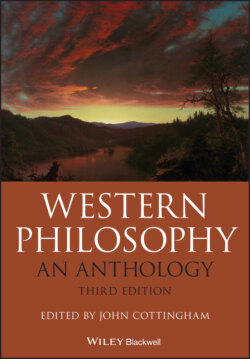Читать книгу Western Philosophy - Группа авторов - Страница 27
Introductory Essay: How to Read a Philosophical Text and How to Write about It What Is Philosophical Inquiry?
ОглавлениеStudents toiling away on the treadmill of academic exams and assignments often learn to survive by showing knowledge – by assimilating as many relevant facts as possible and then dutifully reproducing them in tests or essays. But such a method seldom works very well in philosophy, because philosophy is not primarily a factual subject. Of course, just as with any worthwhile subject, you need to study hard and to familiarize yourself with the material. But philosophizing is never just about absorbing material; it is about standing back and reflecting on it. What is more – and this is perhaps unique to philosophy – it is about reflecting on how the results of your reflections affect your overall worldview.
That may sound rather grand, or even pretentious. But part of what makes philosophy different from other disciplines is that it looks past the particular to the universal. For example, instead of asking ‘how does this particular chemical produce this reaction?’, it raises abstract questions such as ‘what is it to produce or cause a change in the first place?’ Or instead of asking ‘why did this particular historical or literary figure choose to act in this way?’, it asks ‘what do we really mean when we say that an action was freely chosen?’ And not content with asking these abstract and general questions, philosophers often go on to raise even more universal ones, for example about whether all of reality is subject to causal principles, and if so whether this leaves any room for genuine human choice. As will be clear from very many of the writings included in this anthology, philosophy is very different from the specialized academic disciplines, in so far as it characteristically takes up a synoptic perspective: it aims for the ‘big picture’ that keeps in view how the different parts of our understanding fit together or clash. Philosophical inquiry often zeroes in on very precise and carefully defined puzzles, but at its best it never loses sight of the grand fundamental questions about the ultimate nature of reality and our human place within it.
Inquiring into such abstract general questions may come more easily to some than to others, but all of us to some degree have an inbuilt propensity for philosophical reflection. If we always remained totally immersed in our particular pursuits and never took time to stand back and reflect on their wider significance, we would merely be clever animals. To be human is to have an enduring desire to try to make sense of it all, to fit our lives into a wide scheme of understanding. In much of our lives, to be sure, we may just be too busy with the urgent demands of survival and making our way in the world. But sooner or later the uniquely human urge to philosophize will make itself felt.
In the texts that follow, you will find many different styles of philosophizing and many distinct philosophical outlooks. But in all of them you will find that questing spirit of philosophical inquiry which seeks to look beyond the particular involvements of human existence towards more universal and abstract patterns of understanding. There are no easy rules of thumb for how to read the texts or to write about them, though it is hoped that some of the suggestions that follow may be helpful.
